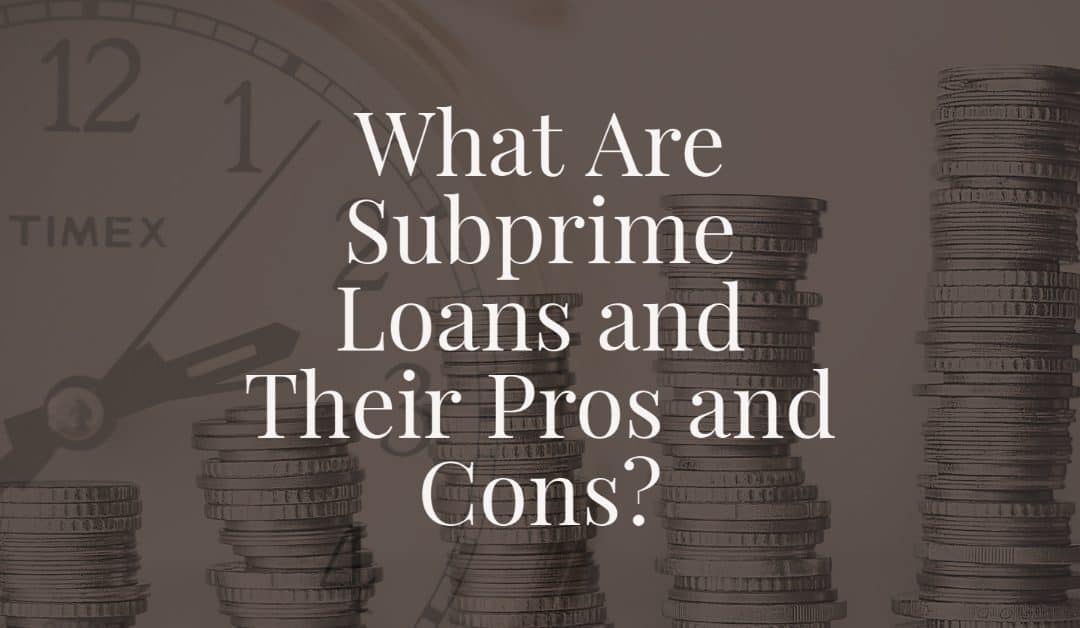A subprime loan is a type of loan offered at a higher rate than prime to people who don’t qualify for prime rate loans. Often, subprime borrowers have been rejected by traditional lenders because they have low credit scores or have other factors that give lenders reasonable doubt that they will default on the debt repayment.
What is a Subprime Loan?
Subprime loans are used for financing individuals with poor credit, low income, or limited credit history. In many cases, lenders will focus on the borrower’s income and how much money they have coming in instead of their credit score. This way, they can be sure that the borrower has enough money to repay the loan.
Borrowers with credit scores below 650 can have a difficult time getting improved for conventional loans. Loan approval can depend on many factors, and having a good credit score is one of those factors. Having a good credit score indicates that you will likely pay off the loan as you have in the past.
Subprime loans were created to help people that may have poor or no credit history. Those people will still need financing when buying a house or car or financing other things that they might not be able to purchase outright, on their own. Many borrowers have the financial ability to pay off a loan, but they need help to qualify for a loan because of their credit score or credit history.
Pros of Subprime Loans
Subprime loans tend to have a bad name because they have higher interest rates. But there are pros to getting a subprime loan as well.
One of the pros of a subprime loan is that borrowers with poor or little credit history can qualify for subprime loans. If a borrower has a high debt-to-income ratio, they can be eligible for subprime loans where they couldn’t qualify for traditional loans.
Subprime loans can make it easier for borrowers to consolidate debt, which will make their payments easier. Subprime loans can help borrowers raise their credit scores if they make their monthly payments on time.
Subprime loans can help borrows become homeowners or buy a vehicle that they wouldn’t be able to buy on their own. This type of financing may be the only choice some have if they are turned down by traditional lenders.
Cons of Subprime Loans
While there are many pros of subprime loans, there are cons as well.
Subprime loans shouldn’t rush into, and you should consider all the pros and cons before making a decision.
One of the cons of subprime loans is that subprime loans carry more risk to lenders, leading to higher interest rates.
Borrowers are also more likely to default on the loan because of the high-interest rates. Because the interest rates are higher than traditional loans, the monthly payments on a subprime loan will be higher.
There are more fees with a subprime loan, such as processing fees and higher up-front fees. These add up quickly and are sometimes too high for borrowers to afford.
Since there are many cons to subprime loans, you should only borrow if you are confident that you will be able to repay it.
Subprime Borrower Characteristics
Often, borrowers that apply for subprime loans share similar characteristics. Borrowers for a subprime loan usually have a credit score that is less than 650. They often have low incomes.
Subprime borrowers often have little to no credit history. They might have a debt-to-income ratio of 50% or more. Borrowers of subprime loans can have late payments on loans and credit cards.
Subprime borrowers may have filed for bankruptcy in the past 60 months or gone through foreclosure in the last 24 months. And often, a borrower of a subprime loan is a new business owner, retiree, or self-employed.
Having these characteristics doesn’t mean that you will be turned down for a traditional loan, but it will make it more difficult. It’s always best to try to raise your credit score and pay down on debt to increase your chances of loan approval and lower interest rates.
When Looking for a Subprime Loan
Subprime loans can be risky, especially if you aren’t prepared for the higher interest rates and extra fees. Be sure to take steps to lower your risk at defaulting on the loan.
It would be best if you shopped around for alternative lenders. Find the best loan for you at the best interest rate you qualify for.
Be sure to budget your income to make sure you can afford the potential loan payment.
Look at your credit report and fix any errors on it. You can also consider asking someone with secure credit to co-sign with you.
Make sure to do your research before you jump into a subprime loan. Remember, this type of financing can be great for people with less than excellent credit but can also come with downfalls.
If you have a subprime loan and are in fear of going into foreclosure, contact Law Zebra. Our consumer protection lawyers are here to help you through to the best possible outcome.

